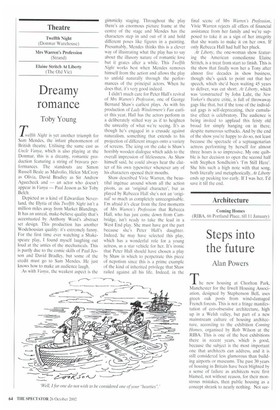Theatre
Twelfth Night (Donmar Warehouse) Mrs Warren's Profession (Strand) Elaine Stritch At Liberty (The Old Vic)
Dreamy romance
Toby Young
welfth Night is yet another triumph for Sam Mendes, the infant phenomenon of British theatre. Utilising the same cast as Uncle Vanya, which is also playing at the Donmar, this is a dreamy, romantic production featuring a string of bravura performances. The standouts are Simon Russell Beale as Malvolio, Helen McCrory as Olivia, David Bradley as Sir Andrew Aguecheek and — an actor who doesn't appear in Vanya — Paul Jesson as Sir Toby Belch.
Depicted as a kind of Edwardian Neverland, the Illyria of this Twelfth Night isn't a million miles away from Market Blandings. It has an unreal, make-believe quality that's accentuated by Anthony Ward's abstract set design. This production has another Wodehousian quality: it's extremely funny. For the first time ever watching a Shakespeare play, I found myself laughing out loud at the antics of the mechanicals. This is partly due to the comic skills of Paul Jesson and David Bradley, but some of the credit must go to Sam Mendes. He just knows how to make an audience laugh.
As with Vanya, the weakest aspect is the
gimmicky staging. Throughout the play there's an enormous picture frame at the centre of the stage and Mendes has the characters step in and out of it and hold different poses like figures in a painting. Presumably, Mendes thinks this is a clever way of illustrating what the play has to say about the illusory nature of romantic love but it grates after a while. This Twelfth Night works best when Mendes removes himself from the action and allows the play to unfold naturally through the performances of the principal actors. When he does that, it's very good indeed.
I didn't much care for Peter Hall's revival of Mrs Warren's Profession, one of George Bernard Shaw's earliest plays. As with his production of Lady Windermere's Fan earlier this year. Hall has the actors perform in a deliberately stilted way as if to heighten the unreality of what we're seeing. It's as though he's engaged in a crusade against naturalism, something that extends to his projection of different images onto a variety of screens. The icing on the cake is Shaw's horribly wooden dialogue which adds to the overall impression of lifelessness. As Shaw himself said, he could always hear the clatter of his own typewriter whenever any of his characters opened their mouths.
Shaw described Vivie Warren, the beautiful ingenue around whom all the action pivots, as an 'original character', but as played by Rebecca Hall she's not an original' so much as completely unrecognisable. I'm afraid it's clear from the first moments of Mrs Warren's Profession that Rebecca Hall, who has just come down from Cambridge, isn't ready to take the lead in a West End play. She must have got the part because she's Peter Hall's daughter. Indeed, he may have selected this play, which has a wonderful role for a young actress, as a star vehicle for her. It's ironic that Peter Hall should have chosen a play by Shaw in which to perpetrate this piece of nepotism since this is a prime example of the kind of inherited privilege that Shaw railed against all his life. Indeed, in the final scene of Mrs Warren's Profession, Vivie Warren rejects all offers of financial assistance from her family and we're supposed to take it as a sign of her integrity that she wants to make it on her own. If only Rebecca Hall had half her pluck.
At Liberty, the one-woman show featuring the American comedienne Elaine Stritch, is a treat from start to finish. This is the show that finally won her a Tony after almost five decades in show business, though she's quick to point out that her speech, which she'd been waiting 45 years to deliver, was cut short. At Liberty, which was 'constructed' by John Lahr, the New Yorker's theatre critic, is full of throwaway gags like that, but if the tone of the individual gags is self-deprecating, their cumulative effect is celebratory. The audience is being invited to applaud this feisty old broad for simply hanging on in there, despite numerous setbacks. And by the end of the show you're happy to do so, not least because the spectacle of a septuagenarian actress performing by herself for almost three hours is so impressive. My one quibble is her decision to open the second half with Stephen Sondheim's 'I'm Still Here'. She hits such a high note with that song, both literally and metaphorically, At Liberty ends up peaking too early. If! was her, I'd save it till the end.


















































































 Previous page
Previous page